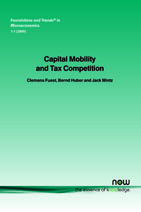Capital Mobility and Tax Competition
By Clemens Fuest, Center for Public Economics, Germany, clemens.fuest@uni-koeln.de | Bernd Huber, Department of Economics, University of Munich, Germany, | Jack Mintz, C.D. Howe Institute and University of Toronto, Canada,
Abstract
This text surveys the literature on the implications of international capital mobility for national tax policies. Our main issue for consideration in this survey is whether taxation of income, specifically capital income will survive, how border crossing investment is taxed relative to domestic investment and whether welfare gains can be achieved through international tax coordination. Our analysis puts special emphasis on multinational firms and the problem of financial arbitrage.
Capital Mobility and Tax Competition
Tax competition and coordination is one of the most pressing issues for tax authorities in modern economies, but it is a highly controversial subject. Some argue that tax competition is beneficial by forcing governments to impose efficient tax prices on residents for the provision of public services. Further, some argue that tax competition is also beneficial by limiting the power of governments to levy taxes. Others take a different view - in a world without coordinated tax policies, governments choose sub-optimal levels of public services financed by inefficient taxes that are either too high or too low by ignoring spillovers imposed on other jurisdictions. Capital Mobility and Tax Competition draws out the most important issues of uncoordinated tax policy at the international level for cross-border transactions. The discussion focuses on mobile tax bases, specifically in relation to investment and financial transactions. The main issue for consideration in this survey is whether taxation of income, specifically capital income will survive, how border crossing investment is taxed relative to domestic investment, and whether welfare gains can be achieved through international tax coordination. This survey derives some of the key results on the taxation of international investment in variants of one model of multinational investment. Finally, the authors emphasize the problem of tax competition and financial arbitrage, an issue which is somewhat neglected in the existing survey literature.
